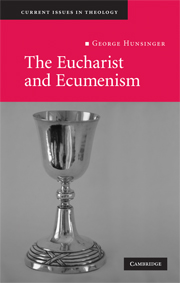Book contents
- Frontmatter
- Contents
- Acknowledgments
- Introduction: Ecumenical theology
- Part I Real presence
- Part II Eucharistic sacrifice
- 3 The sacrifice we offer: controversies
- 4 Christ our Passover: a proposal
- Part III Eucharist and ministry
- Part IV Eucharist and social ethics
- Conclusion: Let us keep the feast
- Index
- References
3 - The sacrifice we offer: controversies
Published online by Cambridge University Press: 05 June 2012
- Frontmatter
- Contents
- Acknowledgments
- Introduction: Ecumenical theology
- Part I Real presence
- Part II Eucharistic sacrifice
- 3 The sacrifice we offer: controversies
- 4 Christ our Passover: a proposal
- Part III Eucharist and ministry
- Part IV Eucharist and social ethics
- Conclusion: Let us keep the feast
- Index
- References
Summary
A sacrifice of thanks and praise: the Reformers on eucharistic sacrifice
Nothing was denounced more vehemently by the Reformation than the Roman Catholic view of the mass as a “propitiatory sacrifice.” To the Reformers almost everything wrong with Catholicism seemed to coalesce at this point. The Catholic mass combined several distinct abuses. They were mercenary, because masses for the dead were shamelessly bought and sold. They were ecclesiological, because the priesthood had usurped an illicit role at the expense of Christ's people. Above all, they were soteriological, because the Roman church had arrogated powers to itself that did not belong to it, but only to Christ. Zwingli, Luther, and Calvin were relentless, in the grand sixteenth-century style, in exposing these interlocking evils.
The focus of attention here will be the soteriological question, and again the approach will be ecumenical. While full agreement may not be possible, a greater measure of common ground exists among the divided churches than might first meet the eye. Today's heirs of the Reformation arguably have much to learn from sacramental traditions like Catholicism about eucharistic sacrifice. A fresh consideration could enrich their understanding of the Lord's Supper. At the same time, many historic Reformation concerns no longer seem incompatible with contemporary Catholic teaching, especially as expressed in official church documents. An attempt will be made to lay some groundwork for decreasing, if not eliminating, the distance separating the churches.
- Type
- Chapter
- Information
- The Eucharist and EcumenismLet Us Keep the Feast, pp. 95 - 127Publisher: Cambridge University PressPrint publication year: 2008



